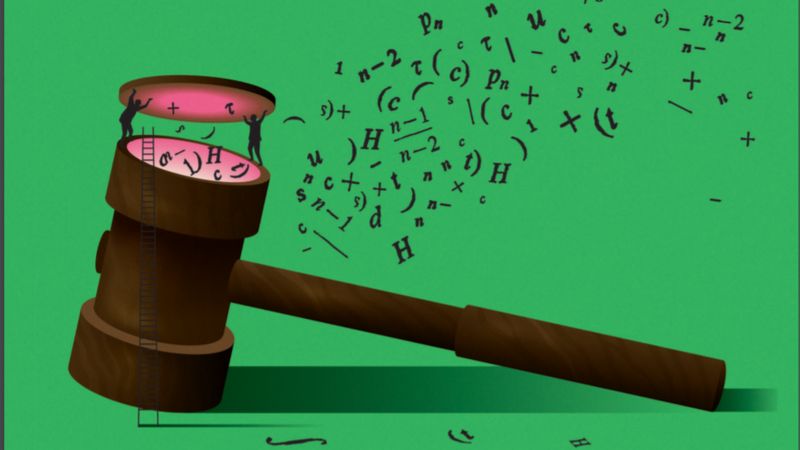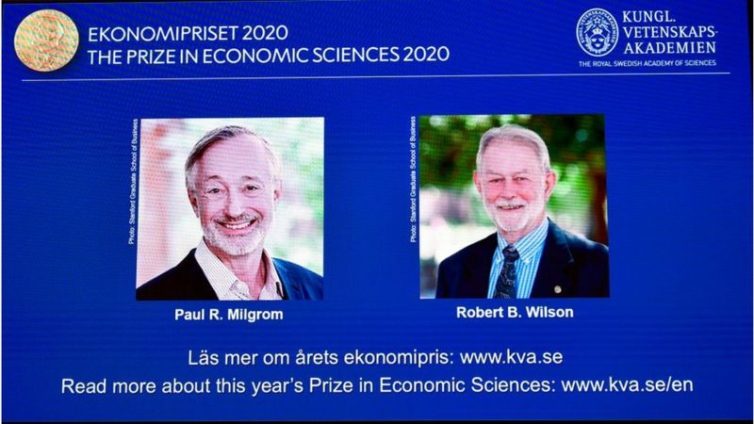Paul Milgrom and Robert Wilson have won the 2020 Nobel Economics Prize for their work on auction theory.
The Stanford University game theorists have helped in developing formats for the sale of aircraft landing slots, radio spectrums, and emissions trading.
The Royal Swedish Academy of Sciences said their work "benefitted sellers, buyers and taxpayers" worldwide. Game theory uses mathematics to study decision-making, conflict, and strategy in social situations.
"This year's laureates in economic sciences started out with fundamental theory and later used their results in practical applications, which have spread globally. Their discoveries are of great benefit to society," said Peter Fredriksson, chair of the prize committee.
Prof Wilson developed a theory for auctions where the value of the object on the block is uncertain beforehand but ends up being the same for everyone - for example, the value of radio frequencies, or the volume of a mineral in a particular area.
He also developed a theory as to why rational bidders tend to place maximum bids that are below what they estimate the actual value of the object to be: they are worried about the so-called "winner's curse" - overpaying to win the auction.

Prof Milgrom put together a theory which takes into account not only auctions where the object turns out to have the same value for all the bidders, but also for auctions where the object is valued differently by different bidders.
He demonstrated that the seller should get a higher revenue when bidders learn more about each other's estimated values during bidding.
The professors invented new formats in response to more complicated auctions where the seller is motivated not only by maximising revenues, but also by the amount of societal benefit that can be achieved, for example, in a radio frequency auction for telecoms operators.
The prize, worth 10m Swedish crowns (£887,000), is not one of the original five Nobel awards created in the 1895 will of industrialist and dynamite inventor Alfred Nobel, but was established by Sweden's central bank and first awarded in 1969.
The prize has been won in the past by economists including Paul Krugman and Milton Friedman, and last year was won by poverty-fighting couple Abhijit Banerjee and Esther Duflo.
Latest Stories
-
Prioritise transparency, avoid suppressing the truth – Opoku-Agyemang advises EC
5 mins -
In times of setbacks, I won’t say I was only the driver’s mate – Naana Jane assures Mahama
7 mins -
Joselyn Dumas opens up on why single mothers struggle to find partners
9 mins -
Three damaged ECG pylons result in power outage for 9 Shama communities
12 mins -
Dual citizens eligible for Chief Justice, Chief Director, other positions – Supreme Court rules
1 hour -
SIGA urges increased financial support for SOEs
1 hour -
Akufo-Addo vows to enhance Ghana’s power supply
1 hour -
19 steps for getting over even the most devastating breakup fast
4 hours -
8th Ghana CEO Summit launched with focus on AI transformation, economic diversification
4 hours -
Prof Opoku-Agyemang has not been given a fair appraisal – Ablakwa
5 hours -
Rainstorm wreaks havoc in Keta and Anloga districts, residents count their losses
5 hours -
Global Plastics Treaty negotiations begin in Ottawa as countries converge on phasing out problematic plastic uses
5 hours -
Support energy alternatives adoption to sustain businesses – GUTA tells government
5 hours -
11th DRIF opens in Accra with a call on governments to focus on digital inclusion
5 hours -
Stakeholders outline plans at RE4C Coalition’s General Assembly in Accra
5 hours

